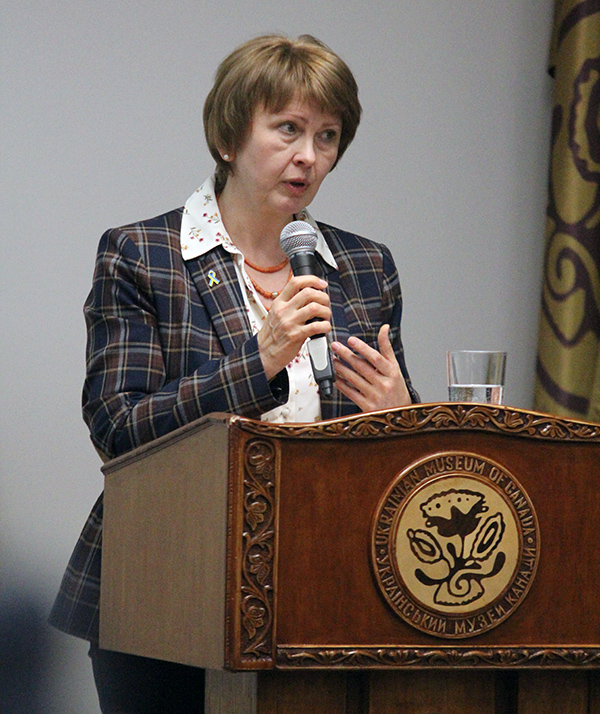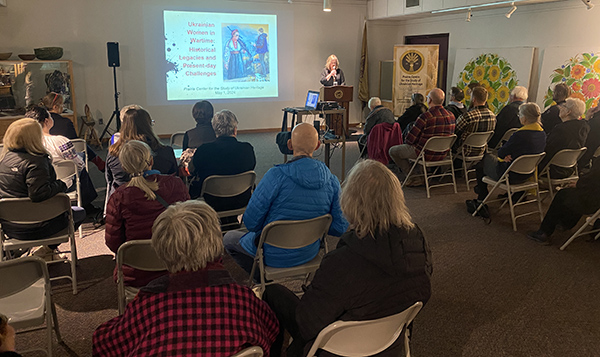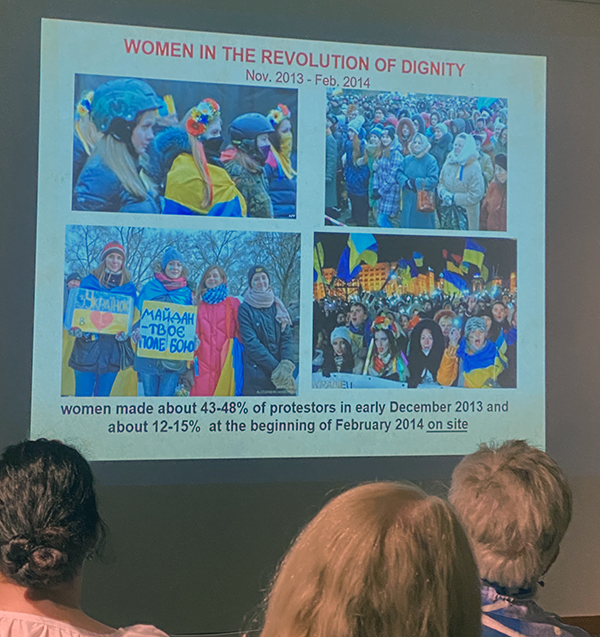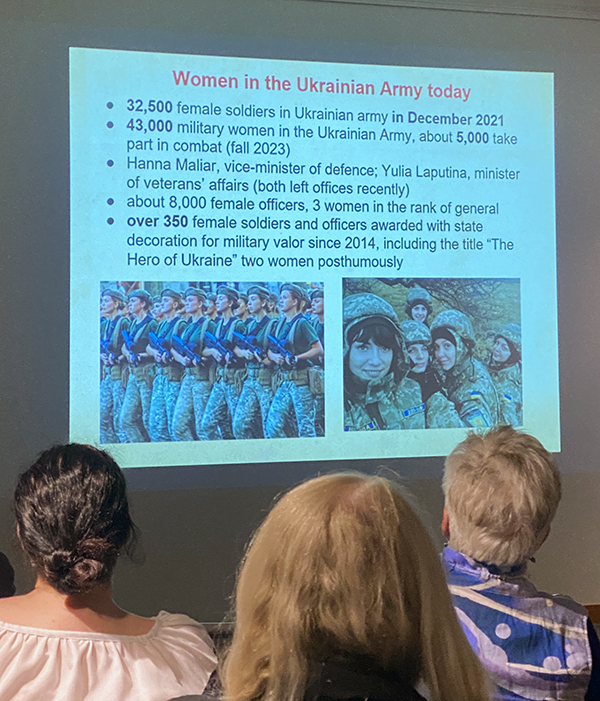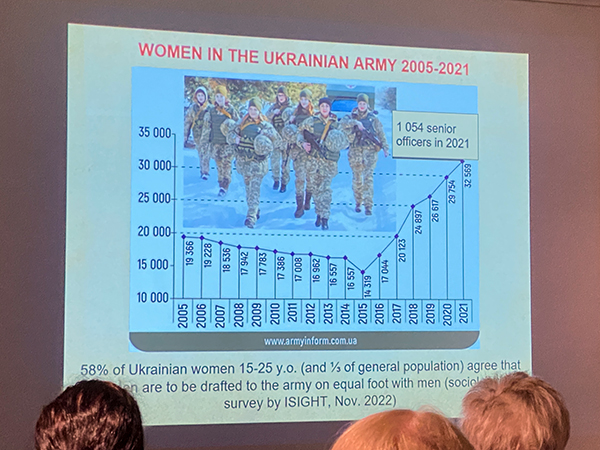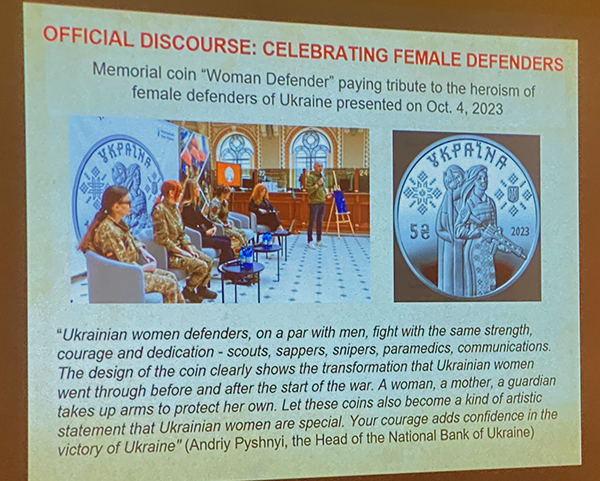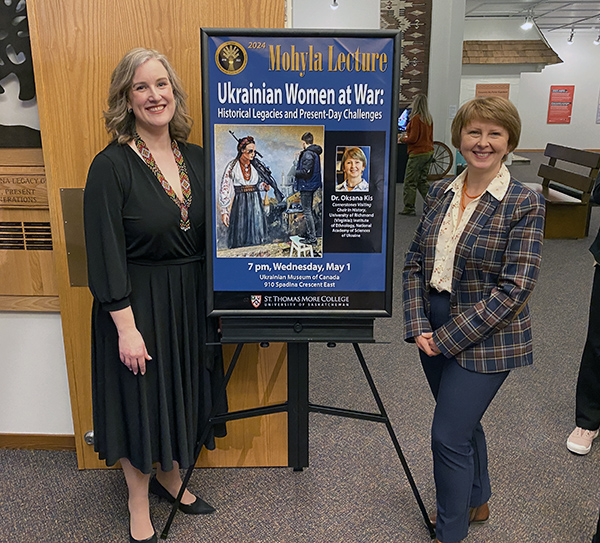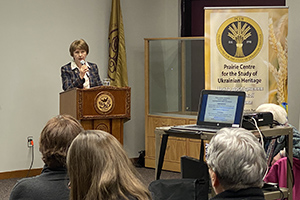
War in Ukraine sees shift in role of women at home and on front lines
2024 Mohyla Lecture focuses on burgeoning hybrid femininity with defense of homeland
By Paul SinkewiczCall it Russia’s war of unintended consequences.
After its full-scale invasion of neighbouring Ukraine in 2022, not only did Russia fail to overwhelm and subjugate the country in a matter of days, as predicted by some, but President Vladimir Putin’s miscalculations included driving more European countries into the NATO fold, turning his own country into an economic pariah, and blunting his own military might against the resurgent and resilient Armed Forces of Ukraine.
Now in its third year, the war has only served to strengthen the spirit of everyday Ukrainians as their sense of identity, history and patriotism grows.
The war, which actually began in 2014 with the annexation of Crimea and conflict with Russian proxy forces in the eastern part of Ukraine, has had another unforeseen effect, according to 2024 Mohyla Lecturer.
It has fundamentally changed Ukrainian society for the better in relation to gender equality, especially in the military and police forces.
Dr. Oksana Kis, Cornerstones Visiting Chair in History, University of Richmond (Virginia); Institute of Ethnology, National Academy of Sciences of Ukraine, spoke of the public perception of the relationship between women and the military, and noted the reaction of Ukrainian women to the war has been varied, wide-ranging and striking.
At one extreme, the Armed Forces of Ukraine (AFU) experienced a surge of volunteers enrolling in the military with the intent of serving on the front lines, while at the other end, there has been a grassroots movement to serve the country on the home front in humanitarian efforts.
Dr. Kis called the new normal in Ukraine a hybrid femininity.
“Over 10 years of war, one can observe a trend toward increasing normalization of the image of the woman warrior,” she said. “This militant femininity does not deny traditional femininity. It is not necessarily about aggression or violence, but rather about the ability to commit radical acts of resistance and participate in active defense of what women believe is worthwhile.”
Today women make up 15-17 per cent of the military, she said, making it one of the highest proportions in the world. They are also increasingly participating in policing. She noted there is a century of history behind that commitment to serve, with women’s corps in the military around since the First World War. During World War II, thousands of young, Soviet Ukrainian women fought in the ranks of the Red Army, and their meaningful contributions were widely publicized in military propaganda.
Kis said the events of 2014 Maidan Revolution of Dignity, which ultimately forced the corrupt, pro-Russian government of Viktor Yanukovych from power, was another example of Ukrainian women asserting their right to fight for the country. Women were ready to serve wherever needed, from kitchens, to first aid posts to the dangerous barricades at the front lines of conflict with the police, but first had to confront sexism and gender-based discrimination.
They would not brook exclusion.
Women’s Squads were formed to create better opportunities for women’s activism in the fight and allow them to be full-fledged participants in the national resistance.
The squads reinvigorated appreciation of Ukrainian history and culture, with many units taking on the mantle of ‘combat witches’, in tribute to the traditional supernatural power of women in Ukrainian folklore.
The Women’s Squads were a grassroots solution to allow women to decide for themselves what would be their contributions to the revolution.
“Women’s experiences on the Maidan were crucial in determining subsequent Ukrainian women’s responses to war. Ultimately those Women’s Squads became major sources of women who volunteered for the army after Russian military aggression on Crimea and Donbass in 2014,” she said.
“This contributed to normalizing the image of a militant femininity in public discourse.”
She the process of working toward mainstream gender equality in the Ukrainian army and military academies continues today, although many issues remain.
Further helping to change Ukrainian society is the growing number of women veterans, and the creation of the women’s veterans movement, which is quite vocal in advocating for women’s rights and counteracting discrimination in the military.
The language is reflecting changing attitudes as military references now include both masculine and feminine language, such as the national day to honour defenders of Ukraine.
On Oct. 4, 2023, the national bank of Ukraine issued a memorial coin celebrating female defenders. It portrays an armed female soldier standing in front of a mother holding a baby, denoting a hybrid femininity, said Kis. “Two sides of the same coin, so to speak.”
“There is a perceptible trend towards focusing more and more on women’s military service, achievements and challenges.”
Kis said the Russian war on Ukraine since 2014 has launched the process of public reassessment of women’s roles the army and engendered support for their growing participation in the national project at large.
Before introducing the 2024 Mohyla Lecture guest presenter, Dr. Nadya Foty-Oneschuk, Interim Director of the Prairie Centre for the Study of Ukrainian Heritage (PCUH), spoke of the centre’s mission to promote the advanced study of many aspects of Ukrainian heritage, culture and life.
“Of course, we do all this against the sombre backdrop of the genocidal war being fought in our ancestral homeland. Our mission to create awareness about Ukraine and honouring the Ukrainian experience in Canada, have become even more important, and we are dedicated to this responsibility wholeheartedly.”
“Already we have seen our student demographic changing in never-before-seen ways, reminding us that our work has never been more necessary or meaningful.”
